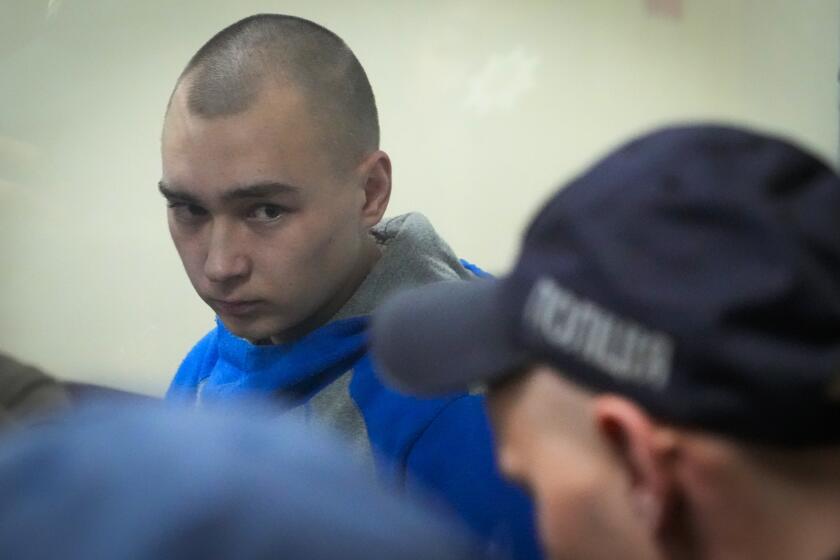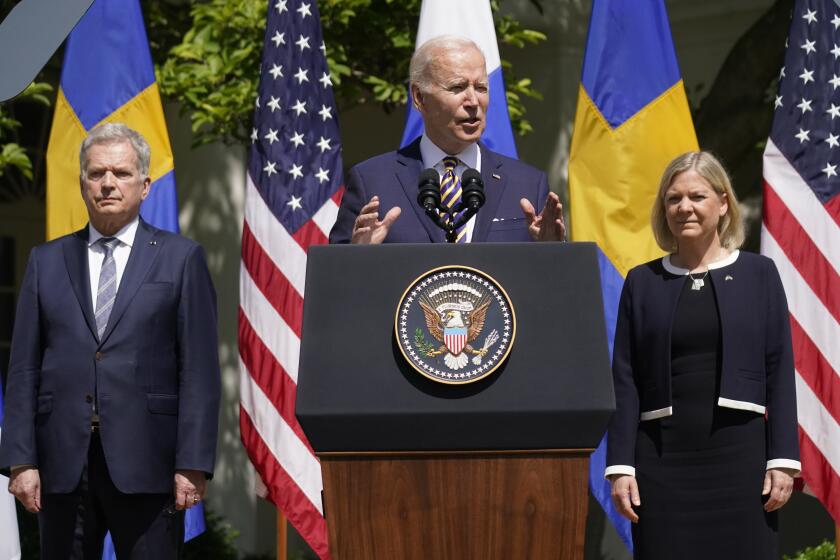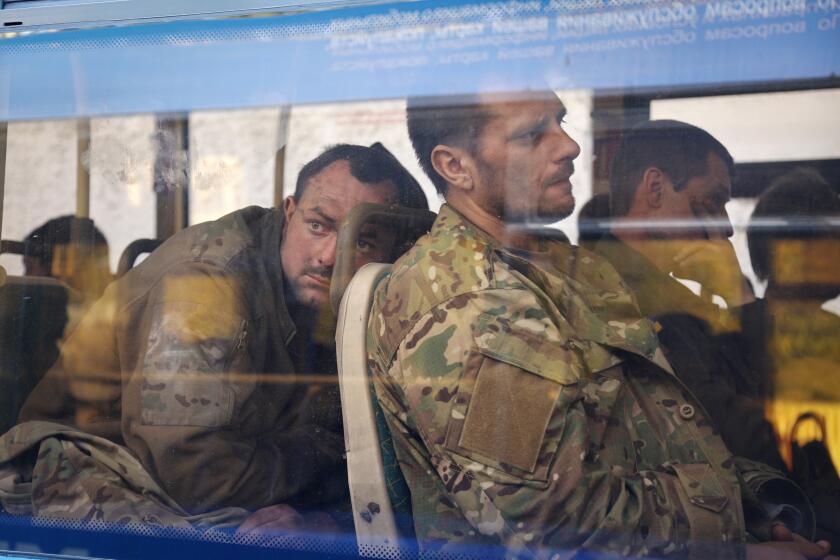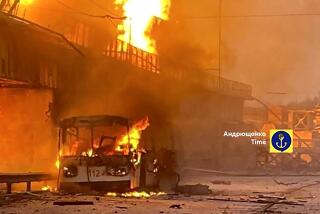Russia declares final victory at steel plant in Mariupol and fights for more territory in eastern Ukraine
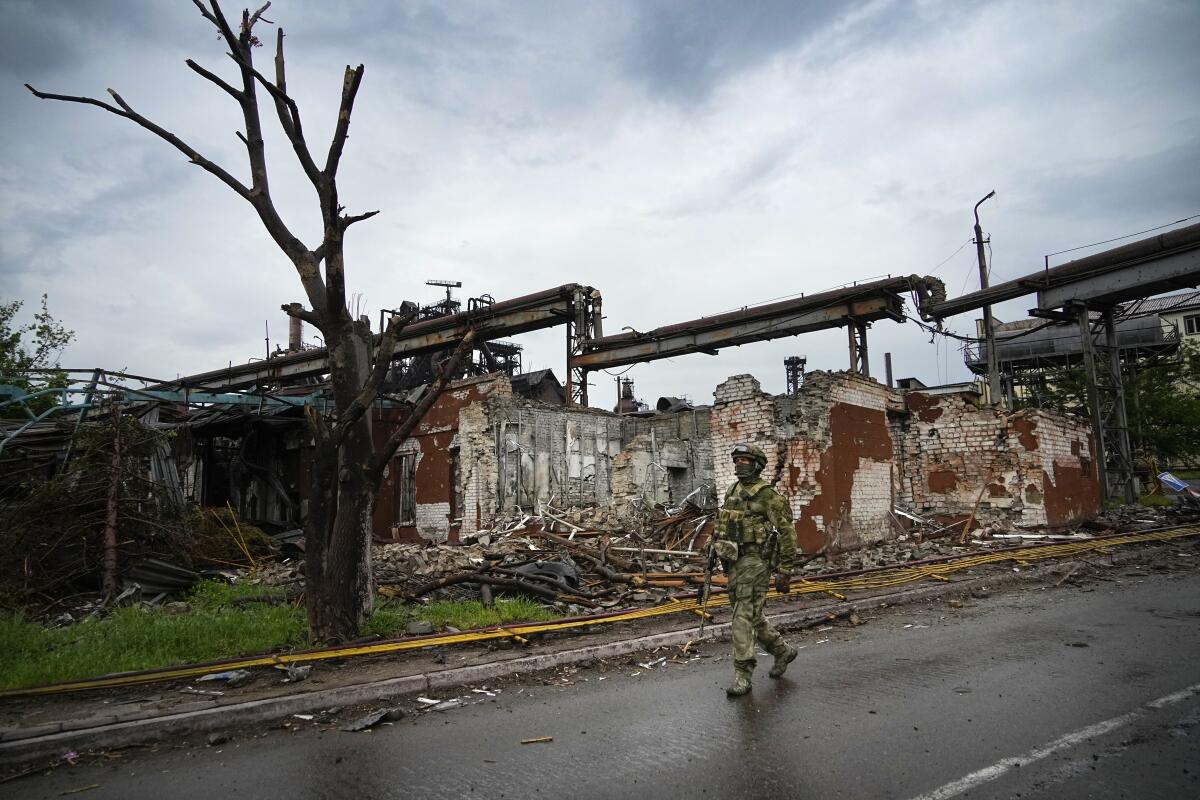
- Share via
KYIV, Ukraine — With full control of the steel plant that transfixed the world for months and a tightened grip on Ukraine’s southern coast, Russia redoubled its assault Friday on the eastern industrial heartland known as the Donbas.
In the vicinity of Severodonetsk — the region’s easternmost city still in Ukrainian hands — at least a dozen people were killed and scores of homes destroyed, the regional governor, Serhiy Haidai, reported on social media.
The nearby city of Lysychansk also came under sustained fire, according to Ukrainian military officials, who said their troops had repelled a series of attacks in the Donbas over the last 24 hours, destroying 14 armored vehicles and shooting down a Russian drone.
And about 120 miles west in the Kharkiv region, a Russian missile destroyed the newly renovated Palace of Culture in the city of Lozova.
Russian military authorities also made their biggest victory of the war official on Friday, announcing that their forces in the southern port city of Mariupol had “completely liberated” the sprawling Azovstal steel plant, where thousands of Ukrainian fighters had hunkered down for more than two months in a brutal standoff.
Maj. Gen. Igor Konashenkov, spokesman for the Russian Defense Ministry, said that all Ukrainian fighters had been removed from the underground bunkers of the factory, according to Russia’s state-run news agency RIA Novosti.
The last group of 531 Ukrainian soldiers at the steel factory surrendered Friday, bringing the total evacuated since Monday to 2,439, according to the ministry.
There was no immediate confirmation from Ukraine. This week, the International Committee of the Red Cross reported that it had registered “hundreds” of Ukrainian prisoners of war from Azovstal.
Experts at the Institute for the Study of War in Washington said the discrepancy could be because of reporting delays. But they also raised the possibility that Russian officials intentionally overstated the number of evacuated Ukrainian fighters — either to maximize the number of Russian prisoners of war they can bring home in an exchange or to avoid the embarrassment of admitting they were locked in a lengthy stalemate with only hundreds of Ukrainian soldiers.
Earlier Friday, Maj. Denys Prokopenko, the Ukrainian commander of the Azov regiment that led the defense of Mariupol, posted a video statement saying that senior military leadership had issued an order to stop defending the city in order to save the “lives and health” of servicemen.
“I hope soon relatives and the whole of Ukraine will be able to bury their soldiers with honors,” Prokopenko said in a video posted on Telegram.
Despite some battlefield successes, the growing war of attrition has exacted a grievous toll on Ukraine’s civilians and infrastructure, with people killed or maimed, houses pulverized and power cut off in hard-hit communities.
A Russian soldier facing the first war crimes trial since the start of the Ukraine war says he fatally shot a civilian on orders from two officers.
In a Friday night video address, Ukrainian President Volodymyr Zelensky urged Western allies to hold Russia financially responsible for the devastation it was wreaking across his country.
“Every burned house. Every ruined school, ruined hospital,” he said. “Each blown-up house of culture and infrastructure facility. Every destroyed enterprise. Every shut-down business.”
Russian funds and property under the jurisdiction of allied countries, Zelensky said, must be “seized or frozen” and then distributed to a special fund for Ukrainian victims
“That would be fair,” he said. “And Russia will feel the true weight of every missile, every bomb, every projectile it has fired at us.”
To bolster Ukraine’s defense, the U.S. Senate approved $40 billion in new aid on Thursday, sending the package to President Biden for his promised signature. In addition, Germany’s finance minister said Friday that the Group of Seven leading industrialized nations would allocate $19.8 billion in aid as part of what the G-7 declared was its commitment “to our united response to Russia’s war of aggression against Ukraine and to our unwavering support to Ukraine.”
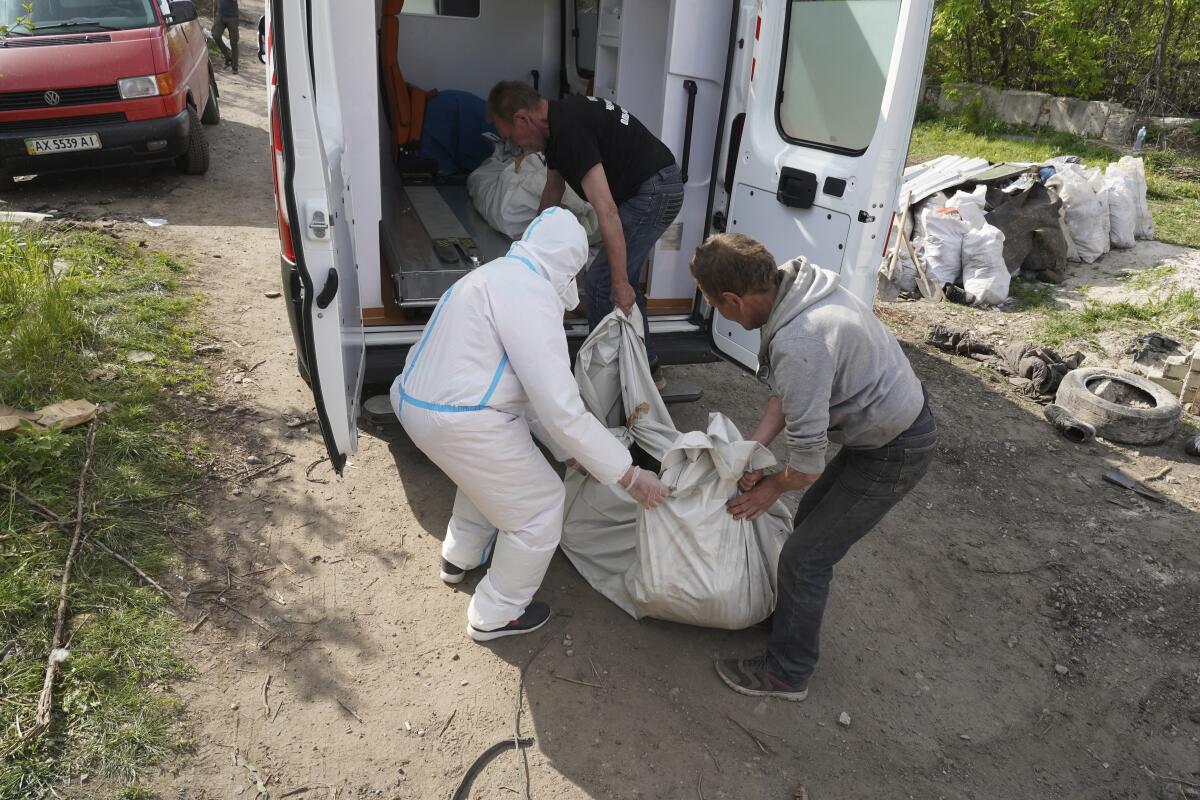
Western military and humanitarian assistance have been crucial to Ukraine’s ability to defy an enemy whose military might, both in personnel and weaponry, dwarfs its own.
“This is a demonstration of strong leadership and a necessary contribution to our common defense of freedom,” Zelensky said of the new U.S. pledge.
Russian President Vladimir Putin on Friday accused Western countries of mounting a “serious,” though ultimately unsuccessful, campaign of cyberattacks against his country.
“A true aggression has been initiated against Russia, a war in informational space,” Putin said to members of Russia’s Security Council, according to Russian state news agency Tass. “That cyberaggression against us, as well as the overall sanctions attack on Russia, has failed.”
The Kremlin has warned of reprisals against countries rallying behind Ukraine. On Friday, Finland’s state-owned natural gas wholesaler, Gasum, said Russia’s state energy company, Gazprom, had announced that it would halt supplies to the Finnish company starting Saturday.
The cutoff comes just a few days after Helsinki submitted its application to join the North Atlantic Treaty Organization, a move that ends decades of official military nonalignment and incenses Moscow. Last month, Gazprom also shut off supplies to Poland and Bulgaria over their refusal to pay for the gas in rubles, which would help prop up the beleaguered Russian currency, instead of in the dollars or euros specified under contract.
President Biden met Thursday with the leaders of Finland and Sweden after both nations formally applied to join NATO this week.
Gasum Chief Executive Mika Wiljanen told customers that the company had “been carefully preparing for this situation” and should be able to keep the pipelines running.
With the conquest of Mariupol, Moscow now controls access to the Sea of Azov and has secured a land corridor that links the Donbas to Crimea, the peninsula it annexed in 2014.
That has had disastrous effects on Ukraine’s economy, particularly its ability to export the grain that millions of people around the world depend on for food. Officials said the loss in trade and the costs of war have contributed to a budget deficit of $5 billion. And reduced exports and rising prices for wheat have worsened food insecurity in Egypt, Pakistan and elsewhere.
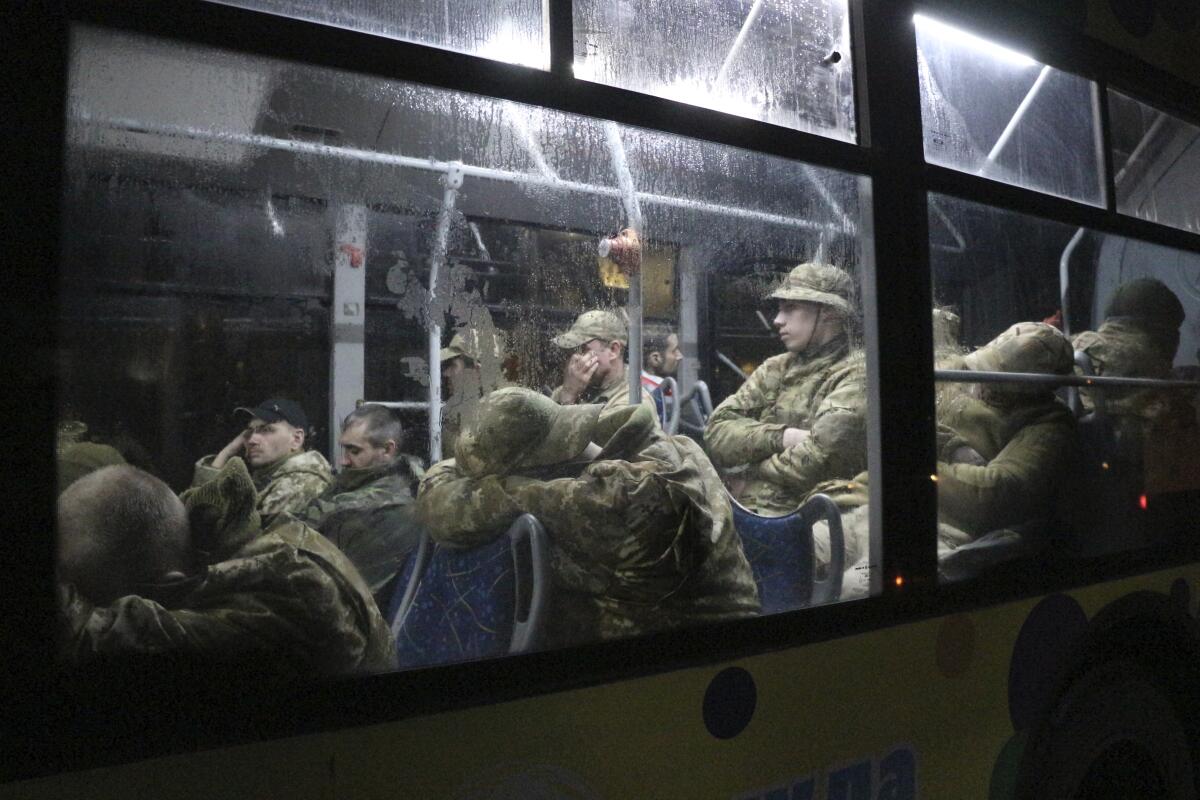
At a United Nations Security Council meeting Thursday to address the crisis, U.S. Secretary of State Antony J. Blinken said the food supply for millions of people worldwide was being “held hostage by the Russian military” — an accusation that Russian officials dismissed as a lie. U.N. Secretary-General Antonio Guterres said he was trying to negotiate a plan to move Ukrainian food exports out through the Black Sea.
Valeriy Zaluzhny, the commander in chief of Ukraine’s armed forces, told journalists that his troops have so far managed to keep the key Black Sea port of Mykolaiv, west of Crimea, under Ukrainian control.
Ukrainian forces are also pushing southeast toward Kherson, the first city to fall after the war began Feb. 24, amid growing signs that Russia is planning to annex parts of the region, including the city of Melitopol, where the occupiers are reportedly introducing the use of the ruble in place of the Ukrainian hryvnia.
Russia scores its first major win with the takeover of the Ukrainian port city of Mariupol. But will it change the course of the war?
Fears remain high for the Ukrainian soldiers captured in Mariupol. Transferred to a penal camp in Russian-controlled territory, many are severely injured and face deep hostility from Russian soldiers and politicians, who have branded the Azov regiment as “Nazis” deserving trial and punishment.
Earlier this week, the government in Kyiv said it was giving up the fight for the devastated city, but a band of diehard soldiers remained holed up in the plant.
Start your day right
Sign up for Essential California for the L.A. Times biggest news, features and recommendations in your inbox six days a week.
You may occasionally receive promotional content from the Los Angeles Times.
Completing its takeover of Mariupol allows Russia to continue moving troops to the Donbas, now the focus of its offensive after its failure to capture Kyiv or the northeastern city of Kharkiv. But having been tied up so long in Mariupol and suffered losses, the forces there “must be re-equipped and refurbished before they can be redeployed effectively,” which can be a lengthy process, Britain’s Ministry of Defense said in its daily assessment of the war.
The Russian military has fallen well short of Putin’s goals for his so-called special military operation in Ukraine. To try to notch more successes quickly, “Russia will probably redistribute their forces swiftly without adequate preparation, which risks further force attrition,” the British assessment said.
The British government reported earlier that a number of senior commanders had already been relieved of their posts, including Lt. Gen. Serhiy Kisel, whose fighters were unable to subdue Kharkiv. Vice Adm. Igor Osipov, the head of Russia’s Black Sea fleet, has also likely been suspended following the sinking of the flagship cruiser Moskva last month, a stunning victory for Ukraine that was aided by U.S.-provided intelligence.
“A culture of cover-ups and scapegoating is probably prevalent within the Russian military and security system,” the British Ministry of Defense said. “Many officials involved in the invasion of Ukraine will likely be increasingly distracted by efforts to avoid personal culpability for Russia’s operational setbacks.”
McDonnell reported from Kyiv, Chu from London and Jarvie from Atlanta.
More to Read
Sign up for Essential California
The most important California stories and recommendations in your inbox every morning.
You may occasionally receive promotional content from the Los Angeles Times.
